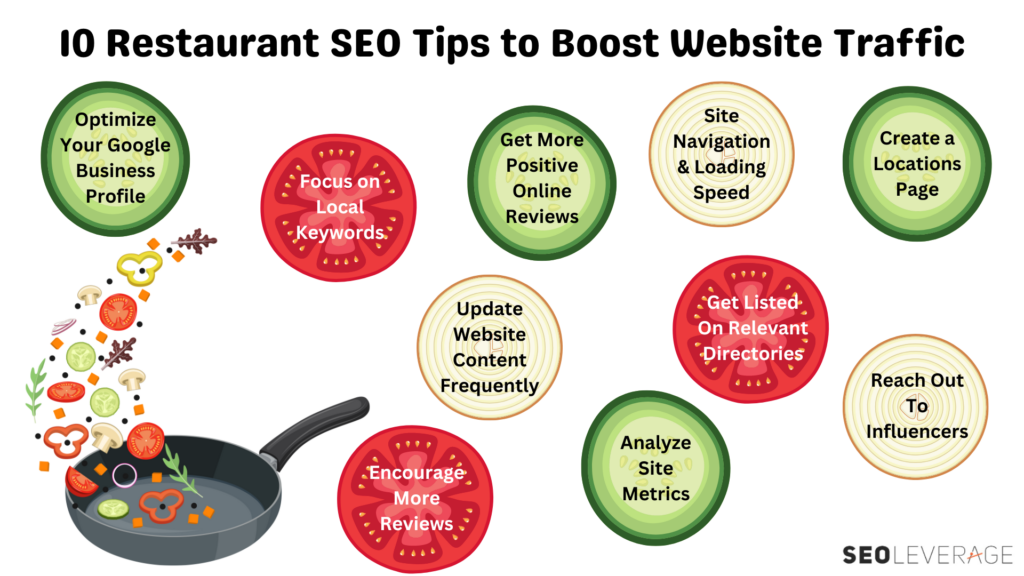For restaurants today, having an online presence is as crucial as having great food and service. A well-optimized website helps drive new customers to your tables. This guide covers proven search engine optimization (SEO) techniques to improve your restaurant's searchability on key platforms like Google.
By optimizing your website content for search phrases diners use to find local eateries, you can increase your organic search traffic and move up higher in rankings. Whether someone is searching for "the best pizza place in Austin" or "family-friendly Mexican restaurants nearby," you want your business to appear prominently.
Implementing core SEO best practices provides a valuable competitive edge for long-term stability in local search results. There is a tremendous opportunity waiting for higher search visibility.
Key Takeaways:
- Effective SEO strategies are crucial for restaurant success as they significantly impact visibility and customer acquisition.
- SEO enables restaurants to attract more customers online by optimizing their digital presence and search engine rankings.
- Optimizing online presence is essential for driving customer traffic, ensuring that potential customers can easily find and engage with the restaurant.
Table of Contents
How Search Engines Work
Search engines use complex algorithms and bots to crawl the web and index websites. When someone performs a Google search, the search engine returns the Google search results page with web pages they deem most relevant to those search terms. The higher a page ranks on search results, the more likely searchers will visit it after performing a query.
Other search engines besides Google index and rank web pages in their search results, including Bing, Yahoo, DuckDuckGo, and more. However, Google sees over 90% of all web searches globally. If you want your site discovered online, Google should be the primary focus of your SEO efforts.
Why SEO Matters for Restaurants
SEO is particularly impactful for the restaurant industry. A study shows that 60% of diners search for local restaurants online, with over half of searchers visiting a restaurant website after viewing it in Google search results. If people can’t find your website on Google, you’re missing out on tremendous opportunities to connect with potential local customers looking for dining options.
Implementing SEO best practices helps your restaurant site rank higher in Google Maps and local search results. This leads to exponential growth in branded and direct search traffic to your website, phone calls, and foot traffic into your physical restaurant. SEO establishes trust and credibility for your brand when you rank prominently for relevant search terms.
Key SEO Components for Restaurants
Various critical elements across onsite and off-site factors can influence restaurant SEO rankings. Optimizing each area builds a cohesive SEO strategy that drives customers to your website and doors.
On-Page SEO
On-page SEO are optimizations made directly on a restaurant's website to improve its indexing and rankings, including:
- Keyword-optimized page titles and headlines
- Compelling meta descriptions
- Fast load speeds
- Mobile responsiveness
- Proper website architecture
- Schema markup for rich results
On-page SEO establishes your restaurant website as a reliable resource for relevant topics and keywords to search engines.
Off-Page SEO
Off-page SEO focuses on building reputation signals through other websites that point back to your restaurant site via backlinks and citations, including:
- Link building from niche websites
- Local directory listings
- Positive online reviews
- Social media profiles
- Industry media coverage
The more quality sites linking to your restaurant website (along with complete NAP name, address, and phone listings across directories), the more authority your page holds in Google's eyes.
Technical SEO
Proper technical SEO configuration ensures search engines can easily access, crawl, and understand your website content, including:
- XML sitemaps
- Robot.txt file
- Image alt text
- Site speed checks
- Source code cleanup
Technical SEO establishes the infrastructure for search bots to rake your pages for indexing efficiently.
10 Restaurant SEO Tips to Boost Website Traffic
Here are actionable restaurant SEO tips to incorporate into your overall SEO strategy:
1. Optimize Your Google Business Profile
Over half of the local search results feature Google Business Profile listings, making this a top priority.
A complete and accurate Google My Business profile serves as the digital storefront for your restaurant brand. Invest time filling in key details like your address, phone number, photos of dishes/interior/exterior, and descriptions of your cuisine, menus, price range, and amenities. Enable online features like reservations or takeout/delivery orders if available.
Monitor and promptly respond to any customer reviews or questions that come in. This level of care and attention helps searchers find, trust, and engage more deeply with your restaurant profile when browsing options in Google Maps or local search.
2. Focus on Local Keywords
Conduct keyword research using tools like Google Keyword Planner to identify high-intent terms for potential diners in your city search.
Incorporate these exact match geo-keywords across your:
- Page titles
- Headings
- Image alt text
- Site content
This signals relevancy for ranking in local SERPs.
Having a good local SEO is very important since 46% of all Google searches are for a local business or service. And if we add that 28% of local searches made from mobile end in a purchase, we can see that it is something worth investing in.
3. Get More Positive Online Reviews
Reviews on Google My Business, Facebook, and Yelp carry tremendous weight for reputation and local SEO.
Actively encourage more positive Google and Yelp reviews by prominently displaying review badges onsite, thanking customers who leave feedback, and professionally resolving any negative comments to build site credibility through higher 5-star ratings that searchers trust when evaluating dining options.
4. Improve Site Navigation and Loading Speed
Mobile usage continues to climb, with nearly 60% of searches now on mobile devices. Ensure seamless navigation for handhelds with the following:
- Responsive design
- Easy clickable elements
- Image compression
- Caching plugins
Faster site speeds greatly improve the user experience and site performance. Quick-loading pages keep visitors engaged as they seamlessly navigate web content or complete conversions like online orders.
5. Create a Locations Page
A dedicated “locations” or “find us” page with embedded Google Maps helps search bots index your NAP details. Include your phone number, street address, and map widget here with surrounding landmarks. This strengthens local ranking signals.
6. Update Website Content Frequently
Regularly update your website content to provide search engines with new things to index while keeping information timely for visitors. Write posts highlighting new seasonal menus or upcoming events or deals.
Refresh any outdated text across existing pages, and fill out thinner sections that need more meat. Internally link these updated or added pages to your vital reservations, menus, and contact pages to boost their site authority.
Frequently managed website content keeps all your pages feeling cohesive, relevant, and lively both for enhancing SEO rankings over time and keeping customers engaged as they explore your offerings.
7. Get Listed On Relevant Directories
Ensure your restaurant's complete and consistent name, address, and phone number (NAP) details are listed on high-authority local business directories like Moz Local, Foursquare, and others. Manually claim and update your profiles on at least 20-30 of these key industry citation sites.
Accurately filling out all your information, from correct street addresses to categorization, helps search engines confirm the legitimacy of your business for better local SEO rankings.
8. Encourage More Reviews
Positive ratings and comments on third-party sites factor into local SEO. Tactfully remind happy customers to share feedback. The more 5-star reviews you get across Google, Facebook, Yelp, and elsewhere, the better.
9. Analyze Site Metrics
Use Google Analytics to measure traffic to key landing pages month-over-month. Track rankings for target keywords in Google search results. Identify new opportunities for growth.
10. Reach Out To Influencers
Partner with local food bloggers or journalists for sponsored posts or product reviews. Link to their high-domain-authority content to score valuable backlinks from trusted sites. Relationships drive referral visits.

Driving More Customers to Your Restaurant with SEO
While search engine optimization (SEO) requires time and effort, the long-term payoff for restaurants can be invaluable. By organizing your website content, citations, and online presence around strategic keywords and optimization best practices, your restaurant gains trust in the eyes of Google and its users. This leads to higher rankings and visibility in search results for relevant dining-related queries in your city.
More prominently ranking content, menus, and contact information in local search results translates into direct actions that drive real restaurant customers, including:
- Increased phone call reservations from mobile SERP clicks
- More online reservations via Yelp and other platforms
- Higher in-store traffic from web searchers who viewed your location
- Bigger waitlists and busier tables
- More positive reviews spread brand awareness
- Expanded customer database for retention campaigns
- Higher lifetime revenue per guest
While the search algorithms constantly evolve, focusing on the core components of local SEO establishes your restaurant as a reliable resource for search engines when people look for dining options in your neighborhood. This authority boosts you above competitors in the race for local visibility.
Connecting with Mobile Diners in Search Results
Local diners on the go turn to Google to discover restaurants nearby serving what they crave. Your website needs to connect with these high-intent mobile users.
Ensure your website is easily readable on smaller screens with the following:
- Legible fonts and text sizes
- Clickable call-to-action buttons
- Streamlined navigation menus
- Minimal pinching/scrolling
- Fast-loading image assets
Also, consider adding an online ordering system. Up to 79% of millennials order food online through apps. An online ordering function on your site makes you more discoverable to younger users searching for delivery options in Google Maps and search.
People who order from a restaurant's website or app are also likely to return to that restaurant again. As ordering out becomes more common, integrating online ordering seamlessly on your site is crucial.
Position your brand to meet mobile searchers wherever they visit your site online, from Google Business profiles to reviews, social media, and more. A mobile-friendly website with online ordering gives your SEO strategy a competitive advantage.
SEO is an Ongoing Process
While search algorithms evolve, the foundations for solid restaurant SEO remain consistent over time. The strategies outlined in this guide establish critical building blocks for long-term stability and search rankings.
Remember - SEO is an ongoing commitment, not a one-time fix. Setting realistic goals across 3-6 month periods gives your efforts time to make an impact.
Let the Experts Handle Your Restaurant's SEO
Optimizing your online presence across all key channels is complex. While the foundations remain stable, search algorithms and best practices constantly evolve. Staying on top of every change yourself takes precious time better spent on your core operations and guests.
The most effective way to drive consistent growth in organic search traffic, rankings, and reservations is to partner with a dedicated local SEO agency. The SEO experts at SEOLeverage help restaurants dominate search results pages through tailored optimization campaigns scaled to your niche, market, and budget.
SEOLeverage's data-driven strategies for GMB profile enhancement, technical site audits, keyword targeting, content marketing, link building, and more can transform your online visibility and brand authority.
Curious about what an amplified online presence could mean for your reservations and checks? Request a free SEO consultation today with SEOLeverage's restaurant marketing pros.

